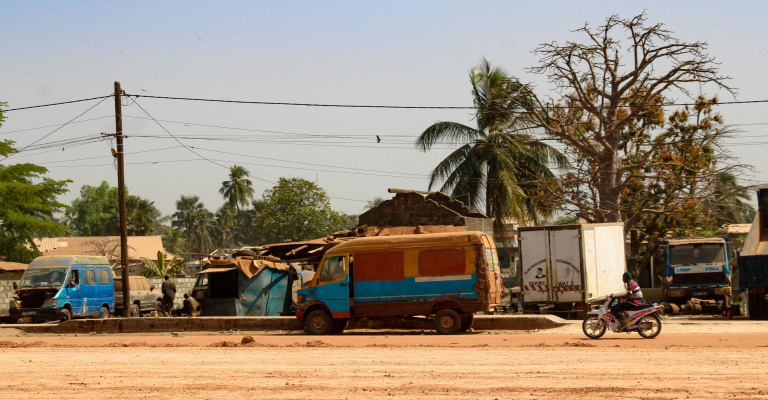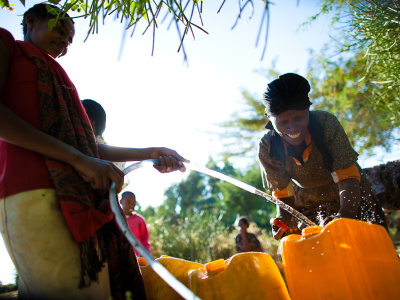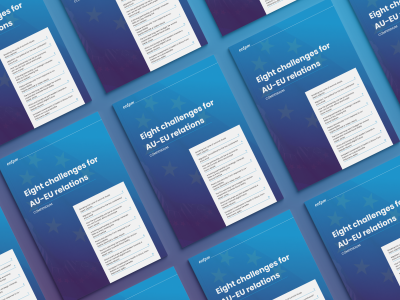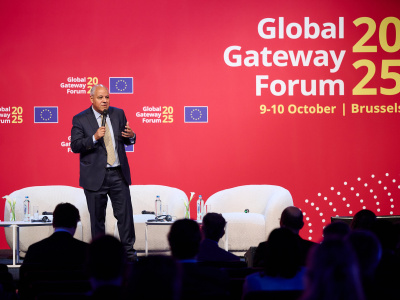
The Global Gateway's missing ingredient: Adding peace to the mix
Authors
Inge Brees from Search for Common Ground argues that without embedding peacebuilding into investment strategies, the EU’s Global Gateway initiative could not just see its ambitious goals undermined, but it could also cause or worsen conflict.
Originally a response to COVID-19, supply chain troubles, and China’s Belt and Road initiative, over time, the Global Gateway has become the EU’s flagship strategy to have more global influence by fostering (European) investments in a more geostrategic and united manner. However, one crucial dimension risks being overlooked in this new economic diplomacy: peace.
As ECDPM notes in their new report: “The ‘security-focused’ principle of the Global Gateway appears to take a narrow view of security, focusing mainly on the reliability and safety of (connectivity and digital) infrastructure”. Yet, without embedding peacebuilding into investment strategies, the EU’s Global Gateway initiative could not just see its ambitious goals undermined, it could also cause or worsen conflict.
Why conflict sensitivity matters for infrastructure investments
Conflict sensitivity is crucial for all EU external action, including Global Gateway. When I participated in a conflict sensitivity training given by my colleague Laurent Kasindi, he presented us with a real case study from the humanitarian world: in a conflict-affected area in central Africa, a makeshift, thatched-roof school was replaced by a much larger, concrete, well-serviced school. One week later, it was burnt down by villagers from across the road. Why? Because infrastructure is not neutral, no matter how genuine our intentions might be, and no matter if we, as outsiders, consider this project to be ‘clearly a win-win for the entire local population’. Infrastructure projects touch upon power dynamics and can lead to conflicts, also in Europe. Yet the risk of violence is much higher in contexts already affected by armed conflict, weak governance and marginalised populations.
For the Belgian readers: does Oosterweel verbinding in Antwerp ring a bell? In a nutshell: 3 decades of divisions and court cases over road infrastructureThis is not a call against investment. There is a large demand for investments in countries and communities affected by armed conflict, as well as a lot of potential for all sides to gain from such an investment. This is a call for thoughtful action.
Including conflict sensitivity from the very start, and how to do it
As a starting point, a conflict analysis can help understand the context and should therefore happen before the decision to invest is made. Regularly updated analysis can inform further adaptation of Global Gateway programming, mitigating unintended negative impacts. This should not be hard, as the capacity for such analysis already exists at EU level and among partners.
A cornerstone of any conflict-sensitive investment is the inclusion of community and government stakeholders in consultations and feedback mechanisms.
A cornerstone of any conflict-sensitive investment is the inclusion of community and government stakeholders in consultations and feedback mechanisms. In Madagascar, Search for Common Ground was once called into a situation after a CEO was held hostage by furious local communities because of unaddressed grievances – clearly that’s a bit late. If you are serious about long-term investment and presence on the ground, then plan in sufficient time for analysis, dialogue and trust-building. True sustainability and stability depend on perceived fairness and local buy-in.
Beyond being part of must-do due diligence requirements, it is simply part of having a good business model for volatile environments, since you know from the start that there may be conflicts. So it is crucial to prepare mechanisms to deal with that, as once violence erupts, it can quickly spiral out of hand. Consultation and feedback mechanisms increase stability and reduce costly disruptions and security costs (as the subsequent years of the Madagascar case study have shown, with positive results for all stakeholders). Moreover, such models enhance the company’s reputation and can reduce insurance costs, improve access to finance and access to markets by meeting various due diligence thresholds.
The EU’s role is to set standards, but also to abide by them
From the perspective of the EU, the bloc could play a leading role in setting - and abiding - a global standard. By leveraging its mandatory due diligence regulations, the EU could require companies seeking market access – and all Global Gateway projects – to uphold conflict-sensitivity standards. This includes demanding participatory conflict analysis, credible monitoring, and meaningful community consultation, ultimately allowing the EU to reduce global risks, foster stability, and set a new standard for responsible business.
The EU could also decide to go a step further, beyond conflict-sensitivity, and aim to be peace-positive. Why not consider improving social cohesion and peace as part of the 360° approach of the Global Gateway strategy, as it helps create an enabling environment for investments? Why not combine support for entrepreneurship and peacebuilding by making work across dividing lines in a conflict (whatever those may be, e.g. across villages) an incentive to access funding?
Meaningfully embedding conflict sensitivity and peace into the Global Gateway offers a triple win: for communities, for companies and for the EU. The Global Gateway's success hinges on embedding conflict-sensitivity, which is the key to fully realising its ambitious objectives. This thoughtful approach ensures the initiative delivers a superior investment model built on a strong commitment to social justice, human security and peace.
The views are those of the authors and not necessarily those of ECDPM.



